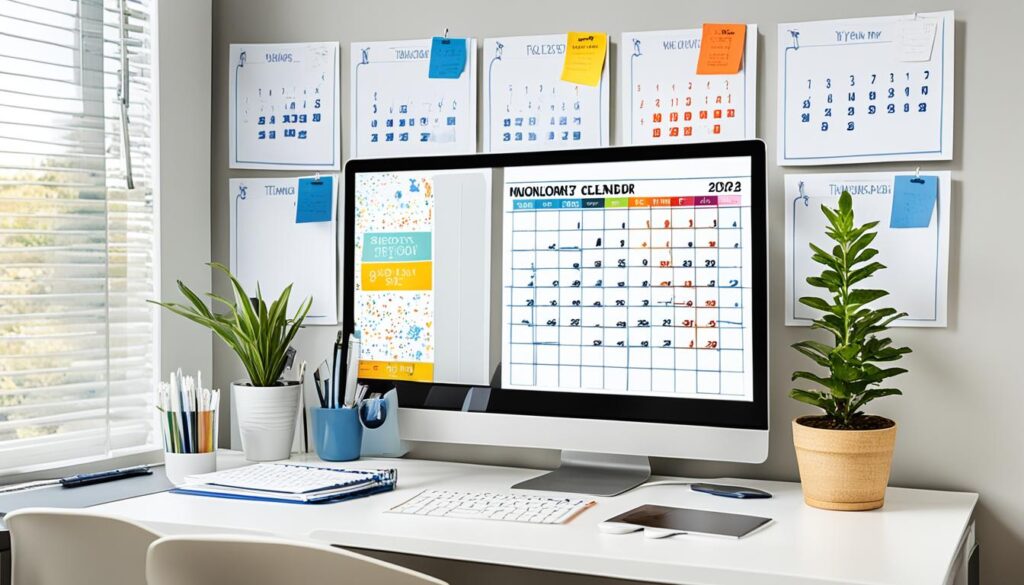
Remote workers can save up to 11 hours each week by not commuting. This unique aspect of working from home lets people be more productive. It also helps them find a better balance between work and life. But, being successful at remote work means using smart time management and being disciplined.
This article will give you useful time management techniques, productivity hacks, and important tips for thriving in a virtual work environment. It doesn’t matter if you’re new to working remotely or not. These time management strategies will help you get the best out of your workday, avoid distractions, and improve your work-life balance.
After reading this, you’ll know how to handle your time well when working from home. You’ll learn great tips for focusing on what’s important, making your remote work productivity better, and managing both your work and personal life well.
Establish a Structured Work Routine
It’s key for remote workers to set up a regular work routine. This helps keep things feeling normal and lets them concentrate. Start with a list of 3 to 5 top-priority tasks for the day. This stops you from making plans that are too big. Also, try to work at the same times you would in an office and take breaks like you normally would. This can stop you from feeling overwhelmed and tired.
Create a To-Do List
Make a daily to-do list with 3-5 important tasks on it. This keeps remote workers on track and stops tasks from piling up. by focusing on the most crucial tasks, you can make steady progress. This method is great for ensuring things get done on time.
Set up a Schedule Mimicking an Office Environment

Try to work at set times just like you would in an office. Maybe from 9 AM to 5 PM. And don’t forget to take breaks like you normally would. This strategy is really good for managing your time well and not feeling burnt out.
Utilize Time-Tracking Software
Time-tracking software can be your best friend if you work remotely. It helps you see how productive you are and find ways to work better. These tools show you how long tasks take and what your work patterns are. This knowledge is essential if you want to improve how you use your time.
| Time-Tracking Software | Key Features | Pricing |
|---|---|---|
| Toggl Track | – Automatic time tracking – Project and task management – Detailed reporting | Free plan, paid plans starting at $9/user/month |
| Harvest | – Time tracking with stopwatch and manual entry – Invoicing and project management – Integration with popular tools | Free plan, paid plans starting at $12/user/month |
| Clockify | – Unlimited users and projects – Detailed time reports – Browser extensions and mobile apps | Free plan, paid plans starting at $5/user/month |
“Establishing a structured work routine can help remote workers maintain a sense of normalcy and stay focused, even in the comfort of their own homes.”
Minimize Distractions in Your Home Environment
Working from home requires us to avoid distractions. These can interrupt our work and focus. By cutting down on social media and handling noise problems, you can make your work area better.
Limit Social Media Usage
Social media is a top distraction for remote workers. To keep focused, set clear limits on using it while working. You can also use apps or browser tools that block social media. This helps you stick to your tasks better.
Communicate with Family Members and Housemates
Talking with your family and housemates about your work time is crucial. It sets the stage for quieter, more focused hours. Make sure they know when you need privacy to work. This understanding can reduce interruptions and make your work environment more peaceful.
Address Noise Concerns with Neighbors or Authorities
Neighbor’s noise can be a big problem for those working from home. If talking to them doesn’t help, consider reaching out to the building’s management or the local authorities. They might be able to solve the issue. This way, you can keep your focus undisturbed by outside sounds.
Separate Work and Personal Spaces
Having a separate workspace at home is key. It draws a clear line between your work and personal life. This setup helps to cut down on distractions. It also makes focusing during your work hours easier.
Use these methods to tackle home distractions. This will help you set up a productive space for working at home.

Managing Time Effectively When Working from Home
With the rise of remote work, time management has emerged as a top challenge. Working at home can bring many distractions, leading to the need for strategies. These include creating a work structure, reducing distractions, and deciding priorities.
To handle work time well, mimicking an office is suggested. This means having a set place to work, fixed work hours, and using a to-do list. You can also use software to track your time and improve productivity.
| Technique | Benefits |
|---|---|
| Structured Work Routine | Maintains a sense of normalcy and discipline, reducing the risk of burnout. |
| To-Do Lists | Enhances focus, prioritization, and a sense of accomplishment. |
| Time-Tracking Software | Identifies productivity issues and opportunities for improvement. |
Reducing home distractions is key to managing time well when working remotely. Try to cut down on social media, talk to family or roommates about your work hours, and have a separate workspace. This space should be just for work, not mixed with personal areas.
“Establishing boundaries and prioritizing focused work time are essential for remote workers to thrive.”
By following these strategies, those who work from home can find a good balance. They can boost their work output and make sure they are managing their schedule wisely.

Prioritize Focused Time Over Fragmented Time
In the world of remote work, more virtual meetings are happening. These meetings help with team unity and talking with each other. But, they can make our workday too broken with blocks of 15-30 minutes in between. This can mess up the deeper work we need to do. To fix this, remote workers need to work on balancing their time better. They should focus on when to meet online and when to work without any interruptions.
Embrace the Increase in Virtual Meetings
Going fully remote has made everyone meet more often online. These meetings are key for keeping everyone together, working as one, and solving issues as they come. But, it’s easy to have too many meetings, making it hard to get any real work done. Remote workers have to learn how to value these virtual meetings. They need to set clear limits so they can also spend good, long stretches on important tasks.
Plan Intentionally for Focused Work Blocks
For remote workers to work well, they must plan their workdays carefully. They should make sure to have solid blocks of time just for work. This means treating these times like they’re as important as any meeting. By making sure they have time to work without being disturbed, they can do their best work. They get to focus on hard jobs, think deeply, and keep their work moving along. Seeing these work blocks as really important helps remote workers push back against too many small interruptions.
“To combat the increase in fragmented time, remote workers should proactively block off periods in their calendars for focused, uninterrupted work. Treating these blocks as scheduled meetings can help protect this time and ensure adequate time is allocated for completing important tasks.”
| Metric | Traditional Office | Remote Work |
|---|---|---|
| Fragmented Time | 20-30% | 30-40% |
| Focused Time | 70-80% | 60-70% |
The table shows us how remote workers are losing more focused time to fragmented time than their office-based colleagues. To turn this around, remote workers need to focus on getting more time to work without interruptions. They should work hard to cut out things that distract them from their main tasks.
Set Boundaries and Communicate Effectively
It’s key to set clear boundaries and share them well with your team for remote work to go smoothly. At home, work can mix with life, causing burnout and less work done. By clearly stating your limits and telling your team, you keep a good balance and have time to focus.
Discuss Work Hours and Focused Time with Your Team
Talk openly with your team about when you work and when you need quiet. Tell them why it’s important to have time for deep work. Also, let them know when you’re free for meetings. This way, everyone knows your work times and will avoid disturbing you.
Manage Your Calendar Proactively
Don’t let others fill in your calendar. Take charge by setting aside focused work time. Think of these times as important meetings. Don’t mark them as “tentative”. Though you can change your schedule, keeping this time protected can help you get your work done.
By setting boundaries and communicating effectively, you craft a remote work setup that boosts your work and happiness. These limits help you use your time and energy well, not to shut the door on others. It’s about better planning to get top results.
Foster Productivity and Accountability
Remote workers need to stay on top of their work. Time-tracking software is key in spotting productivity gaps. It helps them figure out what’s slowing them down. Knowing how they use their time helps them tweak their schedules. They can then focus on important tasks better. This boosts their overall work efficiency.
Address Productivity Issues Promptly
It’s vital to tackle productivity problems fast. Letting them slide can mess up future goals. Acting quickly helps remote workers stay sharp and effective.
Utilize Time-Tracking Data for Self-Improvement
Mining time-tracking data is a game changer for getting better. It shows where time is being wasted. Then, they can decide how to work smarter. This approach helps them work more efficiently.
Create Incentives and Set Goals
Implementing personal incentives and clear goals keeps remote workers driven. They earn rewards for hitting targets. SMART goals give them a roadmap to success. Feeling proud of their work boosts productivity and job satisfaction.
Addressing issues, using data to improve, and setting goals, build a strong work ethic. This approach makes working from home more productive and rewarding.
Embrace Virtual Collaboration and Meetings
The rise of remote work has made virtual meetings and collaboration more important. They help teams stay connected. But, they can also affect how well individuals work. It’s crucial for remote workers to balance their time. They need time for focused work, apart from meetings.
Establish Meeting Rules and Etiquette
To succeed in virtual collaboration, setting meeting rules and etiquette is key. This includes being on time and actively taking part. It’s also important to limit anything that might distract others. Doing this helps create a respectful space for better communication and decision-making.
Balance the Need for Team Connection and Productivity
Virtual meetings keep teams linked but can interfere with personal work. Remote workers must find the right balance. They need to connect with their team but also focus on their work. This involves having fewer meetings, sticking to time limits, and carving out focused work times.
| Virtual Collaboration Best Practices | Benefits |
|---|---|
| Establish clear meeting rules and etiquette | Promotes a productive and respectful virtual environment |
| Limit the frequency and duration of meetings | Allows for more focused, uninterrupted work time |
| Encourage asynchronous collaboration tools | Reduces the need for constant virtual meetings |
| Coordinate team schedules and energy levels | Ensures meetings are scheduled when everyone is most engaged |
“The key to successful virtual collaboration is finding the right balance between team connection and individual productivity. With the right rules, tools, and mindset, remote teams can thrive in the digital workspace.”
Prioritize Energy Management and Self-Care
Energy management matters a lot for those who work from home. It’s key to know when you’re most alert and plan your day around that. When you work with others to sync tasks with when you’re most energetic, everyone wins. This approach boosts work quality and helps avoid exhaustion.
Working at home during the pandemic can be hard. It’s important to be kind to yourself and others, and support your team. Knowing that these are tough times for everyone helps keep spirits up. Offering a listening ear and understanding helps make the work atmosphere more positive and strong.
Identify and Leverage Your High-Energy Periods
Figure out when you’re most focused and full of energy. Put your big tasks during these times to get more done. Trying different ways of scheduling and working can help you figure out the best plan for you.
Coordinate with Team Members’ Energy Levels
It’s smart to know when your colleagues are most energetic too. It leads to better teamwork and job performance. Talking openly with your team can help match up tasks with when everyone’s at their best. This way, you all help the team shine.
Practice Self-Compassion and Support
Being kind to yourself is vital when you’re working from home. This is a hard time for everyone, so remember to be gentle. Make sure to be there for your colleagues too. Working together in a positive and supportive way makes the work experience better for all.
“Remote work can be stressful, but practicing self-compassion and supporting one another is key to maintaining morale and well-being.”
Conclusion
Working from home requires good time management. This helps with staying productive and keeping work and life balanced. Remote workers must set routines, avoid distractions, and focus on their work. It’s important to set limits, be accountable, work well with others online, and take care of themselves. These actions can help them overcome the challenges of remote work.
We have looked at many ways for remote workers to use their time better. Having a specific place to work and communicating well with colleagues are key steps. These approaches let individuals better manage their days and reach their career targets.
Remote work is growing in today’s work culture. Thus, good time management remains very important. By following the advice in this article, remote workers can make their work meaningful and rewarding. This will support their career growth and their happiness.





